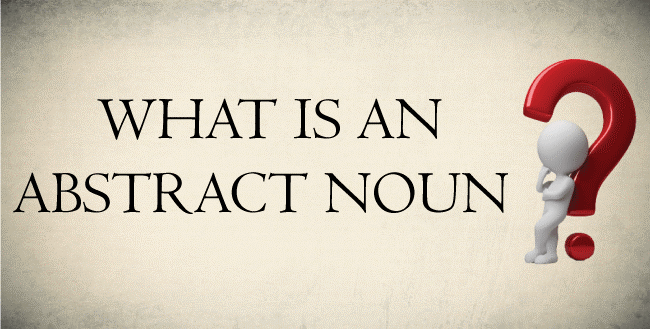Abstract Noun Definition and ExamplesWords that refer to thoughts, ideas, or traits that cannot be physically felt or seen are called abstract nouns. In contrast to concrete nouns, which describe tangible things we can see, touch, hear, taste, or smell, abstract nouns describe intangible things our senses cannot detect. Abstract nouns include love, happiness, courage, beauty, freedom, honesty, justice, and knowledge. Concrete nouns cannot adequately express thoughts, feelings, or other intangible concepts. Hence abstract nouns are crucial. Describing the features or attributes that identify an object, person, or situation helps paint a more vivid and descriptive picture of it. A person's personality can be more understood by describing them as brave, for example, than by only mentioning their appearance. 
Abstract nouns are essential in communication, especially in literature, poetry, and other artistic mediums. They enable the author to convey a deeper meaning and arouse readers' emotions, enhancing the readability and stimulating discussion. What are Abstract Nouns?Words that refer to abstract nouns describe immaterial concepts, thoughts, feelings, or qualities that are not perceptible to the five senses. They represent abstract or intangible concepts like love, freedom, bravery, beauty, happiness, and honesty. Abstract nouns are typically used to describe a mental state or quality not connected to any particular physical object. They are crucial to communication, particularly in literature, poetry, and other forms of artistic expression, because they help us understand emotions, concepts, and attributes more complexly and subtly. Specifications of Abstract NounsSome features of abstract nouns include the following:
Abstract Noun TypesA variety of abstract nouns exist. Here are a few typical instances: Emotions and FeelingsThese abstract nouns describe many feelings and emotions, including love, joy, sadness, rage, and fear. Qualities and CharacteristicsThese abstract nouns describe attributes or traits that can be connected to individuals, things, or circumstances. Examples include grace, integrity, bravery, wisdom, and patience. Concepts and IdeasThese abstract terms denote concepts, philosophies, or ideologies like liberty, justice, democracy, socialism, and capitalism. States and ConditionsThese abstract nouns express various conditions or states, including wealth, happiness, prosperity, and good health. Actions and ProcessesThese abstract nouns describe processes or behaviours, including cooperation, education, transportation, and communication. Groups and CollectionsThese abstract nouns, such as society, team, family, and community, refer to groups or collections of things, people, or concepts. Time and SpaceThese abstract nouns speak of time and space, such as eternity, infinity, duration, and distance. 
Understanding the various categories of abstract nouns might make communicating thoughts and feelings more subtly and accurately easier. Love and FeelingAn intense emotion of compassion, caring, and devotion for someone or something is symbolized by the abstract term "love." A subjective experience characterized by feelings, thoughts, and physiological changes is referred to as an emotion, another abstract term. Integrity and SinceritySince moral and ethical principles are abstract nouns, honesty and integrity are also. Being truthful, direct, and sincere in one's acts and statements is considered honest. It entails speaking the truth, especially when it is inconvenient or difficult, and refraining from lying or deceit. Sincerity is a crucial element of trust and is highly regarded in intimate and business interactions. It is frequently regarded as a foundational moral precept. Conversely, the term "integrity" describes being trustworthy, moral, and upholding high moral standards. It entails sustaining a sense of morality, fairness, and consistency in one's views and deeds. Integrity entails acting honorably even when it is unpopular. Doing the right thing, even when unpopular or inconvenient, is a sign of integrity. It is a crucial trait for leadership and is highly regarded in both interpersonal and professional contexts. Honesty and integrity are highly regarded traits in both intimate and business relationships. They are crucial for sustaining solid and healthy relationships since they contribute to developing trust, respect, and credibility. Knowledge and WisdomThe abstract terms wisdom and knowledge are frequently linked to education, comprehension, and life experience. A person's information, facts, and skills learned through school, experience, or research are referred to as knowledge. It is a collection of data and information that can be saved, retrieved, and used in various contexts to address issues and reach defensible conclusions. 
On the other hand, the ability to use information and experience to form wise judgments and conclusions is known as wisdom. It entails using knowledge to navigate difficult situations and comprehend knowledge's deeper relevance and value. Wisdom frequently requires creativity, critical thinking, and intuition; it is not merely a product of formal education or academic training. Wisdom is essential for forming connections between knowledge and actual circumstances, whereas knowledge is vital for gathering information and understanding the world around us. Making wise decisions, evaluating risks, and navigating challenging interpersonal and social circumstances are all made possible by wisdom. Both wisdom and knowledge are important traits that can help us thrive and leave a positive legacy. Grace and BeautyThe abstract words grace and beauty are frequently used to refer to aesthetics and elegance. Being aesthetically pleasing or enticing is referred to as having beauty. It incorporates elements such as symmetry, proportion, harmony, and colour. Beauty is arbitrary and varies according to societal, historical, and individual variables. Nature, art, people, and objects are all examples of beauty. The trait of elegance, poise, and refinement in movement, behaviour, and appearance is called grace. It entails a sense of fluidity and ease in movement as well as constraint and control in behaviour. Although grace is frequently associated with beauty, it embodies dignity and serenity. While grace is more concerned with an individual's inner qualities, such as self-control, humility, and kindness, beauty is frequently associated with outward appearances. Beauty and grace are prized attributes frequently used to convey admiration and approval in art, culture, and society. Bravery and GutsThe abstract words courage and bravery are frequently used to describe actions of fortitude and fearlessness in the face of peril or hardship. The quality of bravery and readiness to face danger or fear is referred to as courage. It entails the capacity to handle challenging circumstances and make difficult judgments, even in the face of risk or ambiguity. Although it can also refer to moral and emotional fortitude, courage can also refer to physical fortitude. On the other side, the term "bravery" describes the trait of being courageous, heroic, or fearless. It entails being prepared to take chances, confront obstacles, and behave bravely in peril or hardship. Bravery can be demonstrated in various contexts, including battle, sports, or daily life, and frequently incorporates a sense of honour, duty, or loyalty. Although courage and bravery are frequently used interchangeably, bravery is more about taking chances or acting heroically, while courage is more about facing fear or adversity. Both bravery and courage are admired traits in society, and literature, art, and culture frequently honour them. Even in the face of hardship, they motivate others to overcome challenges and pursue greatness. Liberty and FreedomThe concepts of individual rights and independence are frequently discussed in terms of freedom and liberty, two abstract nouns that are sometimes used interchangeably. Being free from restrictions or limitations is being in a condition of freedom. It involves acting, thinking, and communicating without being influenced by other people or outside factors. Freedom can refer to political freedom, such as the freedom to vote and participate in democratic processes, or personal freedom, such as the ability to follow one's religion or lifestyle. Contrarily, liberty is the condition of being free from harsh or authoritarian government. Equity and JusticeFairness and social justice are frequently linked to the abstract words justice and equality. Justice is the attribute of being impartial, fair, and just. It entails defending individual rights and pursuing justice for wrongdoers. Justice can refer to social justice, such as the abolition of prejudice and the promotion of equality, or legal justice, such as the impartial application of the law and the defence of individual rights. On the other side, equality describes the condition of having equal status, privileges, and opportunities. It involves combating discrimination and advancing equitable access to opportunities and resources. Equality can apply to many facets of life, including racial, economic, and gender equality. Although justice and equality are distinct, they are frequently intertwined. Promoting equality and eradicating discrimination is frequently important to attain social justice. Similarly, ensuring everyone is treated equally under the law is frequently a part of administering legal justice. In democratic countries, justice and equality are highly valued and necessary for upholding individual rights, safeguarding vulnerable populations, and fostering social peace. Gratitude and JoyThe abstract nouns "happiness" and "joy" are frequently used to refer to happy feelings and sensations of well-being. The term "happiness" describes the feeling of contentment or joy. It entails a feeling of fulfilment and pleasure with one's life and experiences. Happiness can be a long-term state of being, like having a generally satisfying existence, or a momentary condition, like being joyful in a particular situation. Conversely, "joy" describes a strong sense of pleasure or delight. It involves joy and enthusiasm, frequently accompanied by gratitude and appreciation. Joy can be felt in various contexts, such as enjoying a beautiful day, being with loved ones, or accomplishing a goal. Despite having some similarities, happiness, and joy are two distinct ideas. Joy is a more intense, frequently fleeting experience of happiness, whereas happiness is a more widespread sense of well-being. Joy and happiness are highly regarded feelings linked to better physical and mental health and higher levels of life satisfaction. Calm and TranquillityThe abstract words serenity and peace frequently describe peacefulness and tranquillity. A condition of quiet and tranquillity devoid of disruption or conflict is referred to as being at peace. It can refer to either an outward state, such as peace between countries or groups, or an inner state of being, such as inner peace or peace of mind. Peace can be attained by dispute resolution, mediation, or other peaceful means, and it frequently entails a feeling of harmony and cooperation. Contrarily, serenity is a condition of quiet and tranquillity unburdened by tension, anxiety, or worry. It involves a calmness and quietness of the soul, frequently accompanied by emotions of ease and contentment. One can find peace through mindfulness exercises, meditation, or other means. Despite having some similarities, peace, and serenity are two distinct ideas. Serenity is a more inwardly focused state of calmness and tranquillity that frequently involves personal relaxation and awareness. Peace is a more outwardly focused state of calmness and tranquillity that frequently involves collaboration and conflict resolution. Peace and serenity are highly prized states linked to better physical and mental health and higher levels of life satisfaction. Belief and FaithThe abstract terms "faith" and "belief" are frequently used to refer to religious or spiritual convictions. Strong convictions that aren't always supported by facts are called having faith. It can describe a particular philosophy, a system of moral principles, or a belief in a higher power. Faith frequently entails a sense of devotion, trust, and commitment to a specific set of beliefs. How Do Concrete and Abstract Nouns Differ?Nouns fall into two kinds in English: concrete nouns and abstract nouns. The primary distinction between them is that while abstract nouns refer to things that the five senses cannot perceive, concrete nouns refer to things that can be seen, touched, heard, smelled, or tasted. Concrete nouns describe tangible things like substances, phenomena, or material things. Concrete nouns include a chair, table, car, dog, tree, body of water, and sound. Concrete nouns frequently have a distinct physical form and can be immediately seen through the senses. Contrarily, abstract nouns are intangible and are used to describe ideas, thoughts, feelings, or attributes. Some abstract words are love, freedom, justice, courage, and happiness. Although abstract nouns cannot be sensed, they represent ideas significant to the human experience and can be expressed in language. Examining whether a noun can be felt through the five senses is one approach to telling a concrete noun from an abstract one. It is a concrete noun if it can. If not, the word is probably an abstract noun. 
The ability to distinguish between concrete and abstract nouns is crucial for efficient English communication. Concrete nouns make the language more precise and understandable, whereas complex concepts and emotions can be expressed using abstract nouns. Both nouns are vital parts of the English language and are utilized frequently in spoken and written communication. Sample Sentences using Abstract NounsHere are some examples of sentences with abstract nouns:
In these instances, abstract nouns include love, honesty, wisdom, beauty, courage, justice, happiness, peace, freedom, and education. They stand in for ideas, concepts, feelings, or other aspects that the senses cannot see but are nonetheless significant to the human experience and can be articulated through language. Abstract nouns are crucial parts of the English language that enable us to articulate difficult concepts and feelings. Using Abstract Nouns in Language and CommunicationThere is no way to emphasize abstract nouns' importance to language and communication. These are some of the factors that make abstract nouns significant: Expressing Complex IdeasAbstract nouns allow us to communicate incomprehensible concepts and feelings when expressed using concrete nouns. They aid in communicating ideas fundamental to the human experience, such as love, freedom, justice, and happiness. Giving Language Clarity and PrecisionAbstract nouns give language clarity and precision. By distinguishing between several notions that would otherwise be confused or confounded, abstract nouns enable us to communicate our ideas more clearly. Facilitating Critical ThinkingAbstract nouns encourage us to think more deeply and nuancedly about complicated ideas and concepts, facilitating critical thinking. We can better comprehend ourselves and the world by investigating abstract concepts. Encouraging CreativityAbstract nouns foster creativity by giving people a wide range of vocabulary words to convey intricate concepts and feelings. We may give our writing and speaking more depth and richness by creatively utilizing abstract words. Fostering EmpathyBy enabling us to express and share our feelings and experiences with others, abstract nouns can help us to foster empathy and understanding. By employing abstract nouns, we can communicate our feelings and emotions in a way that is relatable to others and that helps us to comprehend their experiences better. In conclusion, abstract nouns are crucial parts of language and communication. They help us convey complicated thoughts and feelings with clarity and accuracy, and they also develop empathy and critical thinking. Understanding Abstract Nouns in SentencesIt can be challenging to identify abstract nouns in sentences because they refer to abstract ideas rather than tangible things. You can use the following steps to spot abstract nouns in a sentence:
Next TopicAutotroph Definition
|
 For Videos Join Our Youtube Channel: Join Now
For Videos Join Our Youtube Channel: Join Now
Feedback
- Send your Feedback to [email protected]
Help Others, Please Share










